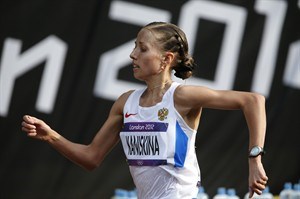
FILE- In this Saturday, Aug. 11, 2012, file photo Russia's Olga Kaniskina walks on her way to win the silver medal at the women's 20-kilometer race walk at the 2012 Summer Olympics in London. Three Russian Olympic champions have been provisionally suspended as part of an investigation into doping in Russian athletics, the International Association of Athletics Federations has told The Associated Press. The three, all race-walkers, are Sergei Kirdyapkin, who won gold in the men’s 50-kilometer race at the London 2012 Olympics, and Valery Borchin and Olga Kaniskina, who won men’s and women’s 20km gold at the Beijing Olympics in 2008. (AP Photo/Emilio Morenatti, file)
Republished January 20, 2015 - 8:04 AM
Original Publication Date January 20, 2015 - 7:10 AM
MOSCOW - Five Russian race-walkers, including three Olympic gold medallists , were banned by the Russian Anti-Doping Agency on Tuesday.
Bans of three years, two months were handed to Olympic champion Sergei Kirdyapkin and Olga Kaniskina, as well as 2011 world champ Sergei Bakulin. All three doping cases backdated to late 2012.
The dates mean Kirdyapkin remains eligible to defend his men's 50-kilometre title at the 2016 Olympics.
Valery Borchin, an Olympic gold medallist in 2008, was banned for eight years from October 2012 for a second doping offence, while Vladimir Kanaykin was banned for life for a repeat offence.
The bans do not affect any Olympic medals, although five world championship gold medals and a silver medal from 2009 and 2011 may be re-awarded.
The world championship results affected are Kaniskina's 20K wins from 2009 and 2011, Borchin's 20K wins in 2009 and 2011, and Kirdyapkin's win in the 50K in 2009. In addition, Kanaykin could lose his 20K silver medal from 2011.
Further sanctions could still apply for Bakulin and Kirdyapkin after photos posted online appeared to show them competing at a Russian meet last month, when they were suspended pending the ruling.
The IAAF has said it is investigating both of them, and further sanctions could rule the pair out of next year's Olympics.
Kaniskina has retired and moved into coaching as head of Russia's training centre, which appears to be in violation of her ban.
All five athletes' bans are based on the findings from their biological passports, which track anomalous blood values over long periods of time.
As well as their bans from late 2012, each of them has had results annulled for select periods of preceding years.
Those periods do not include the 2012 Olympics for any of the five athletes except for Borchin, who did not finish his only race at the London Games, the men's 20K.
In the case of Kirdyapkin, who won the men's 50K, his ban is written to allow his 2012 results from June 12 to Oct. 14 to stand, in between periods in which other results have been annulled.
The Russian Anti-Doping Agency general director Ramil Khabriev said in a statement that the periods of the annulled results were chosen for purely scientific reasons.
"Having analyzed the profiles of the athletes' blood, taking into account the opinion of leading invited hematology experts, a decision was taken on the annulment of results for those periods when abnormal results were detected," he said.
The five athletes had all been suspended since late 2012 with no public announcement until the International Association of Athletics Federations confirmed that situation to The Associated Press this week.
Khabriev said the delay was because the IAAF passed the cases to the Russian athletics federation for adjudication, but he said the federation lacked the resources to deal with "the specificity of biological passport cases."
Khabriev said processing of the cases resumed only this summer after the agency started to investigate the Russian race-walking training centre for multiple doping violations. During the course of that investigation, he said the agency obtained the biological passport data and began its own analysis.
The Russian athletics federation and the national anti-doping agency both faced accusations of misconduct in a documentary broadcast last month by German TV channel ARD.
The federation was accused of operating a systematic doping program, while agency employees were accused of covering up positive tests by leading athletes.
In a statement on Tuesday, Sports Minister Vitaly Mutko criticized the federation, which he said had allowed a situation to develop which "goes against our state anti-doping policy, which we have done very much to propagate."
Mutko said he could not intervene directly but called on the federation to consider "staffing and structural changes in the national team."
News from © The Associated Press, 2015